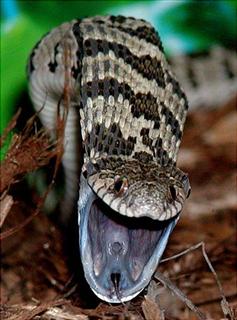African Egg Eating Snake
Common Egg Eater, Rhombic Egg Eater Scientific Name: Dasypeltis scabra
Thu, 3rd April, 2025 - 10:58 pm GMT
Sponsor Ads:

Alternative Name
Common Egg Eater, Rhombic Egg Eater Scientific Name: Dasypeltis scabraBasic Info
The African Egg Eating Snake is a thin snake, and by maturity, the average individual will reach approximately 70 centimeters in length, though some may grow to over a meter in length. The basic coloration is gray to brown with darker square-like patches on the snake's dorsal surface that creates a zigzagging pattern. African Egg Eating Snakes have only rudimentary teeth in the mouth, greatly restricting their diet. There are 25 to 30 tooth-like structures at the back of the neck, which are really modified vertebrae. The Egg Eater is often confused with the Common Night adder in Southeastern Africa because of its rhombic markings. The similarity between these two snakes is a very effective defense mechanism as I have seen seasoned herpetologists who have mistaken the two and subsequently suffered the very painful bite of the night adder. Similarly, in the Southwestern region of Africa it is often confused with the Horned Adder. .
Health
Please keep in mind that this is a snake with very specialized feeding habits. Before acquiring an African Egg Eating snake, make sure that you will have a reliable source for small fresh bird eggs. Enclosure temperatures should remain between 28 and 30 degrees Celsius (about 73 to 80 degrees Fahrenheit), with about a five degree Celsius nighttime drop. Many will do well when kept on a 14 hour day, year round, though due to their nocturnal habits they can be stressed by bright light. A shallow water bowl should be available and humidity should be kept high, usually no lower than 75 percent. A substrate of aspen shavings is often acceptable and climbing opportunities should be provided. Many African Egg Eating Snakes will sleep in bird's nest after eating the eggs, and it may be beneficial to provide a hiding spot similar to a nest for your captive snake - perhaps a small bowl filled with nesting material. African Egg Eating Snakes can usually be kept on quail eggs in captivity, and often they will eat six to seven of these at each feeding. If any eggs remain in the enclosure after two days, they should be removed and discarded. Some African Egg Eating Snakes have problems shedding. In such a case, you may wish place your animal in a plastic sweater box along with some wetted, warm paper towels as a substrate. Shedding problems in an otherwise healthy snake could be a sign that the enclosure's humidity level is too low. Breeding In captivity, African Egg Eating Snakes can usually be bred year round. However, in the wild, breeding occurs in the spring, and often, cooling snakes down to winter temperatures between 68 and 75 degrees Fahrenheit and lowering humidity can aid in encouraging breeding. Usually, African Egg Eating Snakes deposit between 6 and 25 eggs. They do not lay eggs in one location; rather, the clutch is usually scattered after a gestation period lasting between 80 and 90 days. Hatchling African Egg Eating Snakes can be fed finch eggs.Habitat
Lives in grassy savannahs or wooded areas.Behavior
The African Egg Eating Snake, though not widespread in captivity, is a truly fascinating reptile. It is unique in its eating habits, and can make a rare and impressive pet. Normally nocturnal, African Egg Eating Snakes usually spend days hiding in a sheltered area. Often a rock or log can provide a sheltered hiding spot. In the wild, most eggs eaten by African Egg Eating Snakes are laid by Weaver Birds. These snakes are adept at tree climbing, which is often important when the snake accesses birds' nests. Before consuming an egg, the African Egg Eating Snake will first test the egg with its tongue to ensure that it is not rotten. The snake then holds the egg in its constricting coils as it pushes its head over the egg. Amazingly, the African Egg Eating Snake can swallow eggs that are up to three times the size of its head. After swallowing the egg, pleated folds of gum tissue expand and contract to suck the egg further inside the snake. A series of tooth-like structures located at the back of the neck pierce the egg as the African Egg Eating Snake bends its head sharply. After the contents of the egg have been evacuated through these piercings, the eggshell will be regurgitated, flattened and emptied though whole. The defense of the African Egg Eating Snake includes coiling and straightening motions in rapid succession, rasping or hissing noises, and occasionally striking out. However, because they lack teeth, bites from African Egg Eating Snakes are largely harmless. Many African Egg Eating Snakes are said to be relatively docile, and do not often make threatening or defensive displays.Origin
Southern AfricaHistory
African Egg Eating Snakes have impressed people for centuries. In fact, in many mythologies, a serpent is said to swallow the sun at night, during eclipses, or during the winter solstice, before spitting out the disc once more. It is thought that this tradition could be based on the egg eating habits of snakes. Native to southern areas of Africa, the African Egg Eating Snake usually lives in grassy savannahs or wooded areas.Common Foods
They will eat just about any animal of appropriate size including each other and other reptiles, fish, birds, rodents, pigs, and monkeys.Sponsor Ads:
I'm not sure which upsets me more: that people are so unwilling to accept responsibility for their own actions, or that they are so eager to regulate everyone else's.
African Egg Eating Snake
Coded by: BGID® | ALL RIGHTS RESERVED Copyright © 2000-2025
Disclaimer | Privacy | Report Errors / Contact | Credits








 President of the United States of America - Real Estate mogul, Pageant owner and now one of the most controversial men in political history.
President of the United States of America - Real Estate mogul, Pageant owner and now one of the most controversial men in political history.  Politician, US Vice President and President of the USA - Joseph Robinette Biden Jr.
Politician, US Vice President and President of the USA - Joseph Robinette Biden Jr.  versus
versus  Russia: 'The Evil Empire'? Are they all that bad or is it just the USA trying to portray Russia as bad because they are a world power with land bigger and a society very different from the USA ideal?
Russia: 'The Evil Empire'? Are they all that bad or is it just the USA trying to portray Russia as bad because they are a world power with land bigger and a society very different from the USA ideal?  Global warming has been in and out as the "latest" hot topic for many years. It is, according to modern scientists, the result of man-made industrial pollutants, clearing forested areas, agriculture, etc. But now they are thinking it started way before the Industrial Revolution...
Global warming has been in and out as the "latest" hot topic for many years. It is, according to modern scientists, the result of man-made industrial pollutants, clearing forested areas, agriculture, etc. But now they are thinking it started way before the Industrial Revolution... 
 Corona virus
Corona virus 
 Users with wide screen monitors can benefit from more content on every page.
Users with wide screen monitors can benefit from more content on every page.